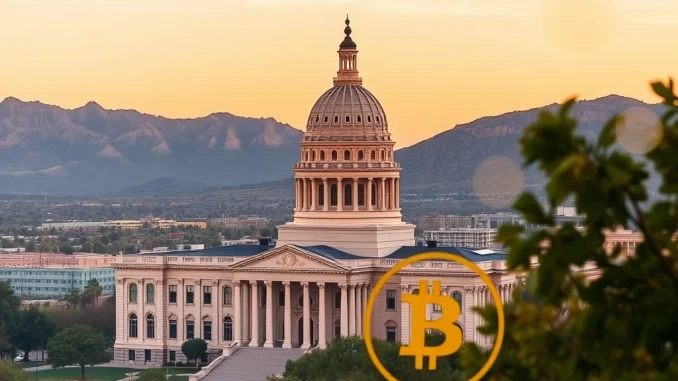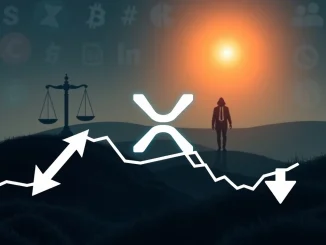
A significant development is unfolding in the Grand Canyon State, capturing the attention of cryptocurrency enthusiasts and policy watchers alike. The Arizona Senate has given its approval to a bill that could pave the way for the state to hold digital assets. This move marks a notable step forward in the intersection of government finance and emerging technologies like Bitcoin.
What is the Arizona Bitcoin Bill?
The piece of legislation at the heart of this news is known as Arizona Bitcoin bill, specifically HB 2324. Initially facing hurdles, the bill was brought back for consideration and successfully passed the Senate in a tight 16-14 vote. As reported, it now moves to the House for further action. The core purpose of HB 2324 is to authorize Arizona to create a Bitcoin Reserve, or more broadly, a digital asset reserve.
Establishing a State Digital Asset Reserve
The proposed reserve wouldn’t be funded through typical state budgets or tax revenues. Instead, the bill specifies that the digital assets held in this reserve would primarily come from seized cryptocurrency. This means crypto assets confiscated by law enforcement through criminal forfeiture processes could be retained by the state rather than immediately liquidated. The concept of a state digital asset reserve is still relatively new in the U.S., making Arizona’s potential move noteworthy.
Key aspects of the bill and the proposed reserve:
- Source of Assets: Cryptocurrency obtained through criminal forfeiture.
- Purpose: To establish and maintain a state digital asset reserve.
- Assets Included: The bill refers to “digital assets,” which includes cryptocurrencies like Bitcoin.
- Status: Passed the Senate, now advances to the House.
Why Consider a Bitcoin Reserve?
The idea behind allowing a state to hold seized crypto assets rather than selling them immediately touches upon several potential benefits and considerations:
- Potential Asset Appreciation: Proponents might argue that holding assets like Bitcoin offers potential for appreciation over time, adding value to state coffers beyond the initial seized amount.
- Diversification: It represents a form of asset diversification, albeit one with significant volatility.
- Expertise Development: Managing such a reserve requires developing expertise in digital asset handling, custody, and security within state agencies.
However, challenges and risks are also inherent:
- Volatility: The price of Bitcoin and other cryptocurrencies can be highly volatile, meaning the value of the reserve could fluctuate dramatically.
- Security: Securely storing digital assets requires robust cybersecurity measures to prevent theft or loss.
- Regulatory Clarity: The regulatory landscape for digital assets is still evolving, which could impact how the reserve is managed.
The Journey of HB 2324
The passage of HB 2324 through the Arizona Senate wasn’t a straightforward process, requiring a reconsideration motion to get it back on the floor for a vote. This indicates the debate and differing opinions surrounding the bill within the state legislature. The narrow 16-14 vote underscores the contentious nature of integrating volatile digital assets into state financial practices. Its progression to the House means it still faces hurdles before potentially becoming law.
What’s Next for Arizona’s Crypto Aspirations?
Should the bill pass the House and be signed into law, Arizona would join a small group of jurisdictions exploring the holding of digital assets. This doesn’t necessarily mean Arizona is buying Bitcoin directly, but rather that it has the legal framework to retain and manage seized cryptocurrency as part of a reserve. The specific rules and procedures for managing this reserve would likely be established by relevant state agencies, outlining how the assets are secured, valued, and potentially utilized in the future.
This development is a bellwether for how states might handle assets confiscated in the digital age. As cryptocurrency becomes more prevalent, law enforcement agencies are increasingly seizing digital assets involved in illicit activities. Bills like Arizona’s propose a mechanism for managing these assets in a way that could potentially benefit the state, rather than simply liquidating them immediately.
In Conclusion
The Arizona Senate’s passage of the Arizona Bitcoin bill (HB 2324) represents a significant step towards the state potentially establishing a state digital asset reserve using seized cryptocurrency. While not a direct state investment in Bitcoin, it signals a growing legislative acknowledgment of digital assets and their potential role, even within the context of criminal forfeiture. The bill’s journey is not yet complete, as it heads to the House. This legislative effort in Arizona highlights the ongoing exploration by governments into how to interact with and potentially benefit from the world of digital assets.



